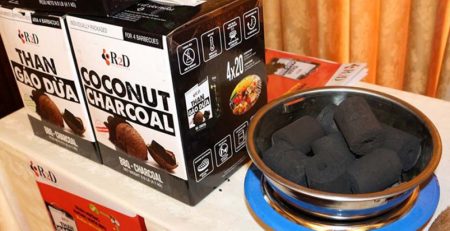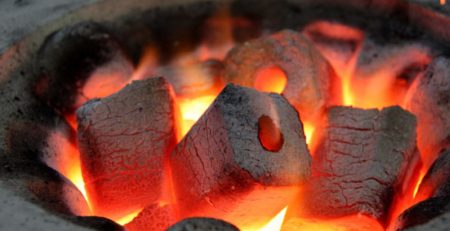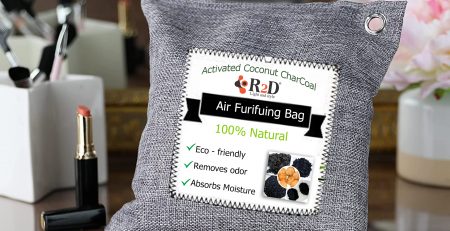Making coconut shell charcoal without smoke, Quang Tri girl quit processing crude to Hong Kong to build Vietnamese brand, determined to export abroad.
Making coconut shell charcoal without smoke, Quang Tri girl quit processing crude to Hong Kong to build Vietnamese brand, determined to export abroad.
Le Hien, owner of the smokeless coal project, sells products to many grilled restaurants in Vietnam, on Lazada, Alibaba. Hien stopped selling processed products to Hong Kong and was determined to bring Vietnamese-branded products to the world.
From the coconut shells, into smokeless charcoal products, overcome toxic disadvantages and pollution of charcoal
“Smokeless coal originated from a study of a foreign partner to overcome the smoke in coal. I researched and knew that smoke starts from raw materials that are not well processed. After researching, I found smokeless coal is a good product. Both domestic and foreign markets are needed. In addition, it is sustainable renewable energy because I use it from agricultural waste like coconut shells. In the near future, I will study the husks of the nuts to apply in this coal, ”said Le Hien, owner of the smokeless coal project R2D. R2D has just won the first prize of the 3rd agricultural start-up organized by BSA.
Born in 1984, as a food technology engineer, Hien started his career from coffee and starch … but failed. Still worrying about abundant agricultural resources and discarded by-products, Hien decided to make smokeless charcoal because she understood the causes of smoke from the coal and the status of coal for food and the environment.
Grilled food which is popular with many people. Some people grill wood, others grill the kitchen, but there are disadvantages. Charcoal pollutes the environment and shoots ash into food, sparks at users. Compared to the grill, fire barbecue still has a characteristic odor that cannot be replaced.
“Smoke and smell due to the material. If handled well, there is no odor and no smoke. Currently in Ben Tre, coconut shells have an output of about 9,000 tons, mainly for handicrafts. At the most, it is used to make coconut charcoal exported to China cheaply. Instead of burning and converting to carbon, burning is not finished and so coal will have smoke. ”, Hien talked about the cause of smoke in coal.
Start tinkering research, Hien has fumbled out products that are smokeless, odorless, do not shoot sparks and do not use any kind of adhesive.
She buys raw materials from the stores selling grated coconut, coconut candy, coconut oil in Ho Chi Minh City … to process coal. “Coconut shells must be old to have high heat and little ash,” she shared.
Large market
Through Hien research, it is found that in Ho Chi Minh City alone, there are 229 large grill shops, using 150 kg of coal every day. On average, each month about 1030 tons of coal. And the households consume about 100 tons / month. Women can use smokeless coal for postpartum use, this amount is about 80 tons / month. The market both at home and abroad is large because it is in line with the trend of the era and is environmentally friendly.
Le Hien, owner of R2D smokeless coal project.
Thinking that and Hien has more motivation. At first, she took care of everything. Now the company has 4 office workers and 4 workers. 3 processing units and 1 factory in Tay Ninh. Each day R2D produces about 2.5 tons of coal.
Currently, the company is selling products with many barbecue shops in Ho Chi Minh City, BBQ restaurants, clean food stores Organica, Lazada, Alibaba …
“Sales volume for restaurant chains is the biggest. In addition, we have retail customers who are distributors, gas stations. Market segments of gas and coal stoves differ. Smokeless coal only competes with charcoal, ”said the Quang Tri girl.
The price of charcoal in the market is about VND 15,000 / kg. Smokeless coal is about 20% more economical than charcoal and the selling price is about VND 18,000 / kg, so it is environmentally friendly, so the products of R2D can be competitive.
In the past, crude exports to Hong Kong were now sold under Vietnamese brands
Hien has applied e-commerce by reaching out to Alibaba to find foreign partners. “We are negotiating with an American partner to export R2D branded products, Vietnamese products, no longer exporting raw materials,” Hien said happily.
Hien believes that e-commerce is a strategic step to bring products to consumers. First, she researched the market. After that, she thought selling on Alibaba would reach foreign customers.
“I want to see what is required of products in the US and Europe and make qualified products to be able to enter their markets. After that, I always took such international products to return to Vietnam market, ”the project owner added.




